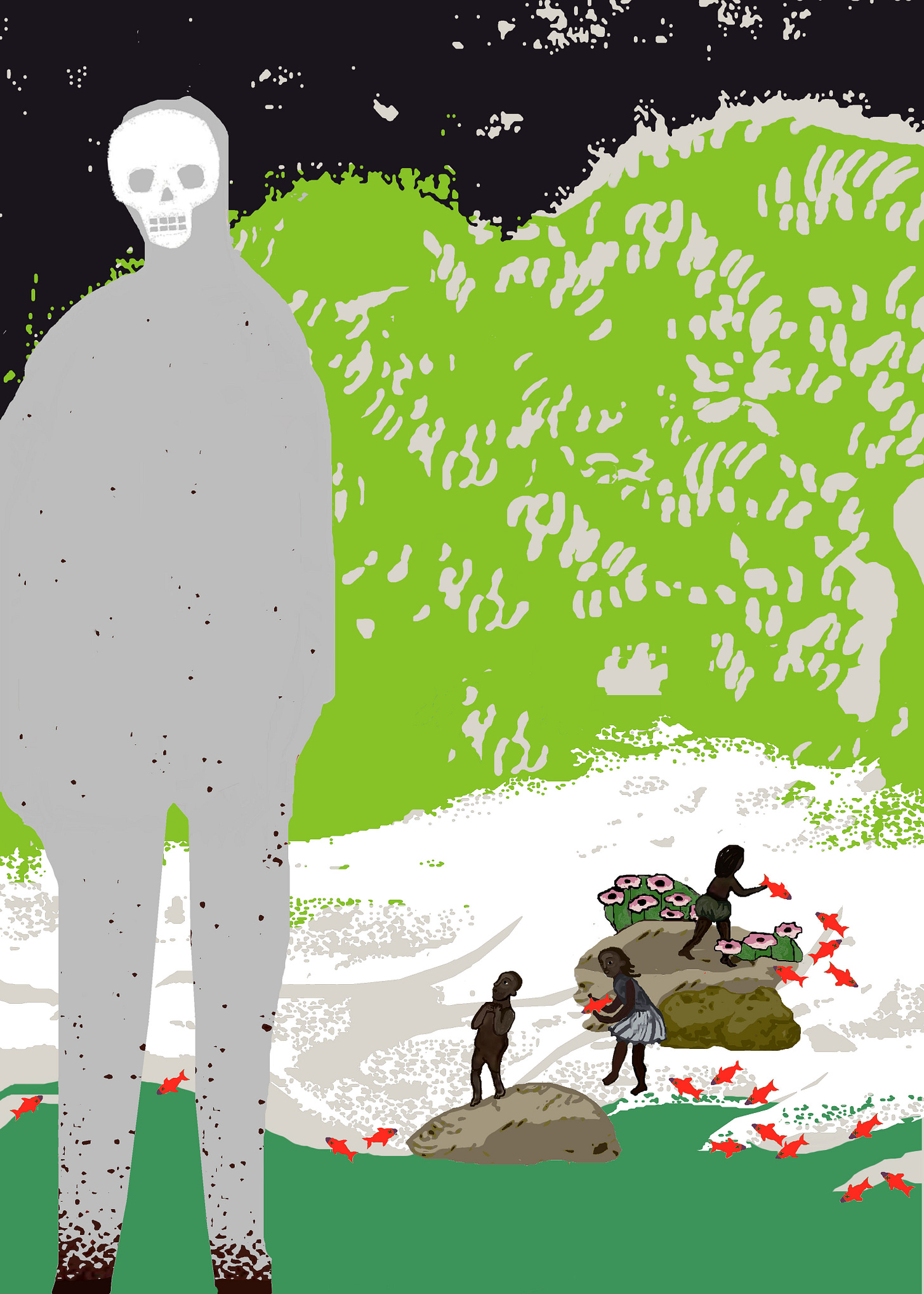Reading from René Girard’s Things Hidden Since the Foundation of the World
(Audio version at end of piece)
(Art by Michelle Horsley)
Christianity & Anti-Christianity
Religion is organized around a more or less violent disavowal of human violence. That is what the religion that comes from man amounts to, as opposed to the religion that comes from God. . . . The Gospels make all forms of “mythologizing” impossible since, by revealing the founding mechanism, they stop it from functioning. That is why we have fewer and fewer myths all the time, in our universe dominated by the Gospels, and more and more texts bearing on persecution (Girard, p. 160, 167).
Nature abhors a vacuum, and Girard may have been underestimating—or simply ignoring—the modern, astroturfed myths of superheroes, rock, sports, and movie stars, and political celebrity-saviors. Certainly, we don’t live in a cultural void of modern mythologizing, and sacrificial violence is still frequently central to these myths (as illustrated by the Trump “assassination attempt”).
And while it’s fair to say that new religions haven’t literally formed around superhero comics or Star Wars movies, they fill a void and thereby offer a debased alternative. And needless to say, people are still being scapegoated.1
Girard believed that late-modern Christian societies produce no mythologies, no rituals, and no prohibitions. Nietzsche’s “death of God,” signaling the end of religion and the dawn of the secular age, came about not despite but through Christianity. Paradoxically, in order to prevail as a religion, Christianity had to invert the Gospels’ meaning, to turn Christ’s death into a sacrifice, and thereby, once again, make a scapegoat the head cornerstone of a new religion.
Thus we have the narrative that Jesus died for our sins, that he was sacrificed by God, just as Abraham was going to sacrifice his son, to save humanity. According to Girard, this is an inversion of the truth: Christ was murdered by human beings—by Satan moving through humans, which is to say, the mechanism of mimetic violence—simply because he didn’t participate in that mechanism.
Girard’s work maps a correlation between these three things: the ascension of Christianity as the dominant religion in the West; the “death of God”; and the coming of a secular, anti-Christian age.
Like a medical institution created to deliver a panacea that abolishes all further need for medical interventions, Christianity contained within it the seeds of its own demolition.
Two Kingdoms
“And if you do good to those who do good to you, what credit is that to you? For even sinners do the same. And if you lend to those from whom you hope to receive, what credit is that to you? Even sinners lend to sinners to receive as much again. But love your enemies and do good, and lend expecting nothing in return” —Luke 6, 33-35.
Of this passage Girard writes:
No one can see that the true nature of violence is deduced with implacable logic from the simple and single rule of the Kingdom. No one can see that disobeying or obeying this rule gives rise to two kingdoms which cannot communicate with one another, since they are separated by a real abyss. Mankind can cross this abyss, but to do so all men together should adopt the single rule of the Kingdom of God. The decision to do so must come from each individual separately, however. For once, others are not involved (Girard, p. 191).
Like the book of Job in the Old Testament, the Gospel’s truth reveals its own foundations as a murderous lie: for God to become real to us, all previous interpretations, all prior forms of worship, first need to be shown to be false.
Said differently, Christianity is a necessary means to deliver the Truth, but it can only do so by concealing it. If it hadn’t been concealed, there would have been no Christianity, nor any need for it. Because if it hadn’t been concealed (via the misunderstanding of all those who heard it), the kingdom of heaven would have arrived, there and then.
Christ’s crucifixion, then, was only possible because his words were not received. Yet this was always an inevitability, one that made Christ’s coming necessary in the first place.
Girard implies that the late-modern rejection of Judeo-Christianity, in a certain sense, is correct; but he adds the proviso that what’s being rejected, ironically enough, is the same thing Christ was rejecting. This means that, when people reject Christianity, they do so without realizing that they’re invoking the actual spirit of Christianity, which is to reject sacrificial religion!
Irony piles atop irony, however, because by rejecting it without understanding, modern intellectuals are creating a scapegoat out of Christianity, which then becomes the foundation for a new “religion”—that of scientistic progress (progressivism).
Just as the Jews were scapegoated to Christianity, so Christians have been scapegoated to a secular mutation of Christianity—and for the same basic purpose. This speaks to why Christianity seems never to work (never for very long) as an organized religion or institution (or even, perhaps, as a community beyond a certain size).
On the other hand, these may all be necessary stages towards a true faith.
Just as Judaism was necessary for Christianity, so sacrificial Christianity—and its bastard scion of wokism and populism— is needed for true Christianity, or Christ-ianity, to finally take hold and bring in “a new heaven and a new earth” (Revelation 21:1).
But only if we don’t destroy ourselves first.2





